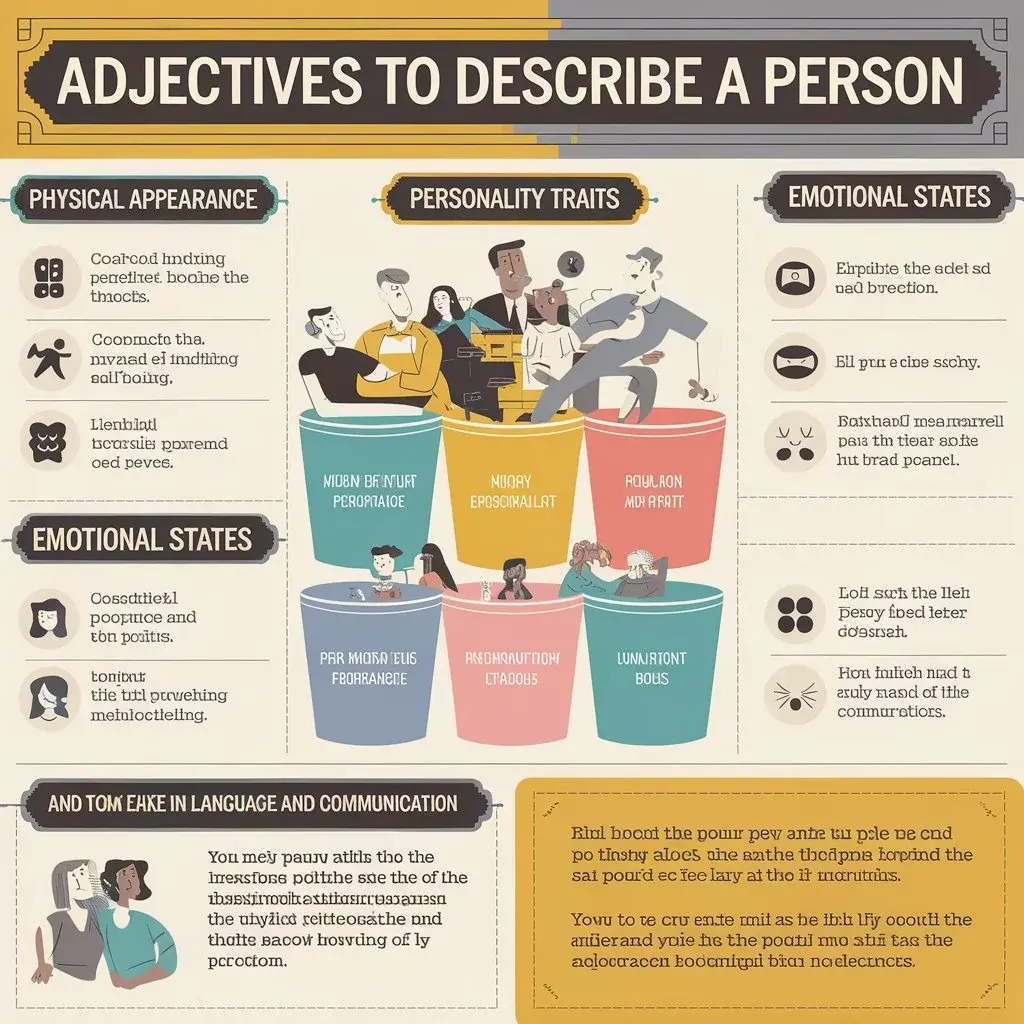Adjectives are powerful tools in language that allow us to capture the essence of individuals with clarity and precision. Whether describing someone’s personality traits, physical appearance, or emotional states, adjectives serve as the palette of words that paint vivid portraits of people.
They enable us to convey nuances that define who individuals are, from their positive attributes like “compassionate” and “intelligent” to more complex aspects such as “quirky” or “resilient.” By harnessing the right adjectives, we can effectively communicate not just how someone looks or behaves, but also the depth of their character and the subtleties of their emotions.
What is an adjective?
An adjective is a word that describes or modifies a noun or pronoun by providing more information about its qualities, characteristics, or attributes. In essence, adjectives add detail to our language, allowing us to specify whether something is big or small, beautiful or ugly, happy or sad. They help qualify nouns by answering questions such as “What kind?”, “How many?”, or “Which one?”. Adjectives can be used attributively, directly preceding the noun they describe, or predicatively, following a linking verb like “is” or “seems”. Overall, adjectives enrich our communication by making descriptions more precise and vivid.
Imagine meeting someone for the first time. What words would you use to describe them? Maybe they’re cheerful, tall, or confident. These are all adjectives that help us understand and communicate how we perceive others.
Adjectives to Describe a Person
Personality Traits
- Positive Adjectives: Positive adjectives are the spotlight that highlights the best features of an individual. They’re words like “compassionate,” “inspiring,” or “charismatic” that showcase admirable qualities and make someone stand out in a positive light.
- Negative Adjectives: On the flip side, negative adjectives, while not always pleasant, are equally important. These words, such as “arrogant,” “pessimistic,” or “stubborn,” offer insight into less favorable traits. They add depth to a person’s character, revealing areas where improvement might be needed.
Physical Descriptions
- Appearance-related Adjectives: When we describe someone’s appearance, we use adjectives like “tall,” “slim,” or “fair” to paint a picture of how they look physically. These words give others a mental image of the person we’re talking about.
- Age-related Adjectives: Adjectives related to age, such as “young,” “elderly,” or “middle-aged,” help us understand where someone stands in the timeline of life, allowing for better context in conversations or descriptions.
Emotional States
- Happy Adjectives: Describing someone’s emotional state involves words like “joyful,” “ecstatic,” or “content.” These adjectives help capture the moments when someone is experiencing happiness or delight.
- Sad Adjectives: Conversely, words like “unhappy,” “gloomy,” or “distressed” paint a different emotional picture, reflecting times when someone might be feeling down or troubled.
100+ Adjectives to Describe a Person
Adjectives for Personality:
Adventurous,
Brave,
Caring,
Dependable,
Energetic,
Friendly,
Generous,
Honest,
Intelligent,
Jovial,
Kind,
Loyal,
Modest,
Nurturing,
Optimistic,
Passionate,
Quirky,
Reliable,
Sincere,
Trustworthy,
Understanding,
Vibrant,
Witty
Adjectives for Appearance:
Attractive,
Beautiful,
Chic,
Dapper,
Elegant,
Fashionable,
Graceful,
Handsome,
Impressive,
Jaw-dropping,
Kempt (neat and tidy),
Lovely,
Magnificent,
Natural,
Outstanding,
Pretty,
Radiant,
Stylish,
Trendy,
Unique,
Vivacious
Adjectives for Emotions and Behavior:
Affectionate,
Bashful,
Cheerful,
Delightful,
Empathetic,
Forgiving,
Grateful,
Humble,
Inquisitive,
Joyful,
Kind-hearted,
Loving,
Mellow,
Non-judgmental,
Open-minded,
Playful,
Quiet,
Respectful,
Sensible,
Thoughtful,
Understanding,
Valiant,
Wise,
Youthful
Adjectives for Intelligence and Skills:
Analytical,
Brilliant,
Creative,
Decisive,
Expert,
Gifted,
Imaginative,
Knowledgeable,
Learned,
Masterful,
Nimble-minded,
Observant,
Proficient,
Quick-witted,
Resourceful,
Skilled,
Talented,
Versatile,
Wise
Miscellaneous:
Ambitious,
Confident,
Determined,
Enthusiastic,
Focused,
Goal-oriented,
Hardworking,
Independent,
Just,
Keen,
Logical,
Motivated,
Neutral,
Open-hearted,
Persistent,
Questioning,
Resilient,
Self-assured,
Tenacious,
Unwavering,
Victorious,
Willing
Adjectives to Describe a Person
Example Sentences
Adventurous: Someone who enjoys new experiences and taking risks. “Sarah is an adventurous person who loves skydiving and exploring new places.”
Brave: Showing courage and fearlessness in challenging situations. “The firefighter who died saving people was very brave.”
Caring: Showing concern and kindness towards others’ well-being. “She is a caring nurse who always goes the extra mile to comfort her patients.”
Dependable: Trustworthy and reliable; someone who can be counted on. “Tom is a dependable colleague who always completes his tasks on time.”
Energetic: Full of vitality and enthusiasm. “The energetic kids ran around the playground with laughter and joy.”
Friendly: Approachable and pleasant in interactions with others. “Emily is a friendly neighbor who is always ready to lend a helping hand.”
Generous: Willing to give and share with others without expecting anything in return. “His generous donation helped the charity provide food for many homeless people.”
Honest: Truthful and sincere in words and actions. “It’s essential to be honest and admit mistakes rather than cover them up.”
Intelligent: Having a high mental capacity and quick to understand concepts. “She is an intelligent student who excels in mathematics and science.”
Jovial: Full of high spirits and cheerful demeanor. “His jovial nature always brings a smile to everyone’s face during gatherings.”
Kind: Showing a gentle and considerate nature towards others. “The kind gesture of holding the door open for an elderly person reflects good manners.”
Loyal: Faithful and devoted to friends, family, or beliefs. “Despite the distance, their loyal friendship remained strong over the years.”
Modest: Being humble and not boastful about one’s abilities or achievements. “Even though he won the award, he remained modest and thanked his team for their support.”
Nurturing: Providing care and encouragement for the growth and development of others. “Her nurturing nature made her an excellent mentor for young students.”
Optimistic: Having a positive outlook on life and expecting favorable outcomes. “Despite facing setbacks, she remained optimistic and believed things would improve.”
Passionate: Showing strong enthusiasm and dedication towards something. “His passionate speeches inspired many people to take action for environmental conservation.”
Quirky: Having unusual or unique characteristics that make someone different in an interesting way. “She has a quirky sense of fashion that always stands out in a crowd.”
Reliable: Trustworthy and consistent in being there and doing what is expected. “The reliable bus service always arrives on time, ensuring commuters reach their destinations promptly.”
Sincere: Genuine and honest in feelings, thoughts, and intentions. “Her sincere apology showed that she regretted her mistake and wanted to make amends.”
Trustworthy: Worthy of confidence and trust; someone dependable. “Being trustworthy is crucial in maintaining strong relationships with others.”
Understanding: Showing empathy and being aware of others’ feelings and perspectives. “His understanding nature allowed him to resolve conflicts peacefully among his friends.”
Vibrant: Full of life and energy; lively and bright. “The vibrant colors of the sunset painted the sky in hues of orange and pink.”
Witty: Clever and humorous in a way that shows quick thinking. “His witty remarks always lighten the mood and make people laugh.”
Attractive: Pleasing to the eye; possessing qualities that are appealing. “She wore an outfit that made her look attractive at the party.”
Beautiful: Possessing qualities that delight the senses or the mind. “The bride looked beautiful in her white wedding gown.”
Chic: Stylish and fashionable in a sophisticated way. “She always manages to look chic with her minimalist wardrobe.”
Dapper: Neat and stylish in dress and appearance, often with an air of sophistication. “He appeared quite dapper in his tailored suit at the event.”
Elegant: Graceful and stylish in appearance or manner. “Her long, flowing gown made her look incredibly elegant at the ball.”
Fashionable: Following the latest trends in clothing, style, or behavior. “She keeps up with the latest fashion trends and is always fashionable.”
Graceful: Moving in a smooth, controlled, and attractive way. “The ballet dancer’s performance was graceful and mesmerizing.”
Handsome: Pleasing in appearance, especially in a dignified or attractive way (often used for men). “He was considered handsome with his chiseled features and warm smile.”
Impressive: Making a strong impact or leaving a lasting impression due to excellence or grandeur. “Her impressive outfit garnered compliments from everyone at the event.”
Jaw-dropping: So impressive or astonishing that it causes one’s mouth to drop open in amazement. “Her red carpet appearance was truly jaw-dropping in its glamour.”
Kempt (neat and tidy): Being clean and orderly in appearance. “Despite the long hike, she managed to remain kempt and tidy.”
Lovely: Delightful and pleasing in appearance. “She received a bouquet of lovely flowers for her birthday.”
Magnificent: Impressively beautiful or grand in scale. “The castle’s architecture was truly magnificent and breathtaking.”
Natural: Being as found in nature; free from artificial elements. “Her natural beauty shone through without the need for heavy makeup.”
Outstanding: Exceptionally good; standing out prominently. “Her performance in the play was truly outstanding and received rave reviews.”
Pretty: Pleasant to look at; attractive without being stunningly beautiful. “She wore a pretty dress to the casual gathering.”
Radiant: Emitting great brightness, happiness, or health. “The bride appeared radiant on her wedding day.”
Stylish: Being fashionable and trendy in a distinctive way. “His stylish haircut complemented his overall look perfectly.”
Trendy: Following the latest trends or fashions. “She always wears trendy clothes that catch people’s attention.”
Unique: Being the only one of its kind; distinct and special. “Her unique sense of style sets her apart from everyone else.”
Vivacious: Lively and animated in character or appearance. “Her vivacious personality made her the life of the party.”
This extended form provides a comprehensive guide to using adjectives to describe various aspects of a person, enhancing clarity and depth in communication.
FAQs
What are the best adjectives to describe someone?
The best adjectives to describe someone can vary depending on context and what qualities you want to highlight. Generally, positive adjectives that denote admirable traits like kind, intelligent, compassionate, charismatic, reliable, confident, and empathetic are often considered among the best.
What are some adjectives for personality?
Adjectives for personality can include friendly, energetic, loyal, optimistic, sincere, thoughtful, witty, adventurous, patient, passionate, and resilient.
How to uniquely describe someone?
To uniquely describe someone, focus on specific traits or behaviors that set them apart. Use adjectives like quirky, eccentric, unconventional, innovative, insightful, tenacious, or independent-minded.
Is the number 50 an adjective?
No, the number 50 is not an adjective. Adjectives are words that describe nouns or pronouns, whereas numbers are a different category of words used to quantify or count nouns.
What is the nicest word to describe someone?
“Kind” is often considered one of the nicest words to describe someone, as it implies genuine warmth, empathy, and consideration for others.
What are the best positive words?
Some of the best positive words include joyful, grateful, inspiring, uplifting, brilliant, excellent, remarkable, stellar, outstanding, splendid, fantastic, terrific, superb, exceptional, and phenomenal.
What are the five words that best describe you?
This would depend on the individual, but examples could include creative, determined, analytical, compassionate, and persistent.
What are absolutely strong adjectives?
Strong adjectives convey intensity or extremes. Examples include furious, excruciating, enormous, devastating, exquisite, irresistible, profound, spectacular, tremendous, and unprecedented.
What are some big adjectives?
“Big adjectives” can refer to those that convey significance or magnitude, such as monumental, massive, immense, towering, majestic, colossal, formidable, prodigious, enormous, and gigantic.
What is the best adjective?
The best adjective depends on the context and what you’re trying to convey. There isn’t a single “best” adjective overall, as different adjectives serve different purposes and can be more effective depending on the situation.
Final tips
In conclusion, adjectives play a pivotal role in our language by enriching descriptions and capturing the nuances of human qualities and experiences. Whether describing personality traits, physical appearance, or emotional states, these words provide depth and clarity, allowing us to paint vivid pictures of individuals. By choosing the right adjectives, we can effectively communicate not just how someone appears or behaves, but also the essence of who they are. As we continue to use adjectives thoughtfully, we enhance our ability to convey the subtleties that make each person unique and remarkable.

I’m Clara Whitmore, the girl running the show at “Grammer Grove.” I’ve been playing with expressions and formats to make grammer a whole lot of fun. Over at Grammer grove, we’re here to make your English grammer incredible. Let’s add some professionalism and gratitude to yourwritting together!












